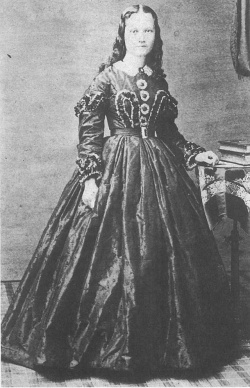Mary E. Foster
ARTICLE UNDER CONSTRUCTION
ARTICLE UNDER CONSTRUCTION
Mrs. Mary E. Foster was a Hawaiian Theosophist who was close to Anagarika Dharmapala and was a great benefactor of the Maha Bodhi Society of India.
Early life
Mary Elizabeth Makahala Robinson was born in Honolulu on September 20, 1844. Her parents were James Robinson, a shipwrecked English sailor, and Rebecca Prever, who was a descendant of the famous Hawaiian king Kamehameha I. Thus, Mary was related to Queen Liliʻuokalani, who was six years older, and was one of the monarch's closest friends. Mark P. Robinson, Mary's brother, served as Queen Lili'uokalani's Minister of Foreign Affairs. [1] It was a difficult time to be royalty in the Islands. During the period 1893-1896, the queen was forcibly and illegally deposed by agents of the American government, and eventually Hawai'i was made a protectorate of the United States.
Mary was educated at the O'ahu Charity School, which taught children of foreign residents married to Hawaiians.
In 1860, Mary Robinson married Thomas R. Foster of Nova Scotia, who founded the Interisland Steam Navigation Company, and owned a shipyard, a shipping agency and a number of schooners. He died in 1889, leaving her a very wealthy widow, as she had also inherited substantial property from her father, who died in 1876.[2]
Theosophical Society involvement
At some point after her husband's death, Mary became interested in Theosophy. She organized lectures and classes, and helped to organize the Aloha Branch in February 1894, with Dr. Auguste Marques as lodge President. They also established several other study groups. Her brother Mark Robinson, a prominent banker and invester, was also involved; he hosted Theosophical gatherings at his home.[3]
Anagarika Dharmapala
Support of Buddhist causes
Foster Botanical Garden
Later years
In her final years she lived in Honolulu with her younger sister, Victoria Ward, and the sister's three middle-aged daughters, in Honolulu.[4] Mary died on December 20, 1930.
Notes
- ↑ Frank Karpiel, "Theosophy, Culture, and Politics in Honolulu, 1890-1920," Hawaiian Journal of History 30 (1996), 172. Available at this website.
- ↑ Frank Karpiel, "Theosophy, Culture, and Politics in Honolulu, 1890-1920," Hawaiian Journal of History 30 (1996), 172. Available at this website.
- ↑ Frank Karpiel, "Theosophy, Culture, and Politics in Honolulu, 1890-1920," Hawaiian Journal of History 30 (1996), 172. Available at this website.
- ↑ U. S. Census, 1930.
